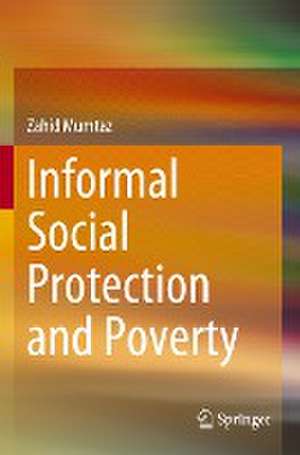Informal Social Protection and Poverty
Autor Zahid Mumtazen Limba Engleză Paperback – 7 oct 2023
This book helps the readers to understand the concept of informal social protection not conceptualized previously. In addition, its various attributes and institutions providing such a form of welfare worldwide are explained indetail; analyzing the usefulness of such a form of social protection would benefit readers of social policy, national governments, and international donor/aid agencies. This book also provides a prescriptive framework for integrating formal and informal social protection.
This book provides a new "Multiple Regime Framework", for identifying various regimes in one country at one point in time by applying a novel data collection and analysis methodology. The application of this framework would be of particular interest to social policy scholars, national governments, and donor/aid agencies because it will result in better targeting of social protection policies in the wake of fiscal constraints. Lastly, this book provides a novel data collection and analysis strategy that will benefit the reader of research methodology, development consultants, donor agencies, and policy practitioners interested in using artificial intelligence to make informed and targetedpolicy decisions.
| Toate formatele și edițiile | Preț | Express |
|---|---|---|
| Paperback (1) | 630.41 lei 6-8 săpt. | |
| Springer Nature Singapore – 7 oct 2023 | 630.41 lei 6-8 săpt. | |
| Hardback (1) | 636.50 lei 6-8 săpt. | |
| Springer Nature Singapore – 6 oct 2022 | 636.50 lei 6-8 săpt. |
Preț: 630.41 lei
Preț vechi: 741.66 lei
-15% Nou
Puncte Express: 946
Preț estimativ în valută:
120.68€ • 124.12$ • 100.12£
120.68€ • 124.12$ • 100.12£
Carte tipărită la comandă
Livrare economică 18 februarie-04 martie
Preluare comenzi: 021 569.72.76
Specificații
ISBN-13: 9789811964763
ISBN-10: 9811964769
Pagini: 295
Ilustrații: XV, 295 p. 22 illus., 2 illus. in color.
Dimensiuni: 155 x 235 mm
Greutate: 0.44 kg
Ediția:1st ed. 2022
Editura: Springer Nature Singapore
Colecția Springer
Locul publicării:Singapore, Singapore
ISBN-10: 9811964769
Pagini: 295
Ilustrații: XV, 295 p. 22 illus., 2 illus. in color.
Dimensiuni: 155 x 235 mm
Greutate: 0.44 kg
Ediția:1st ed. 2022
Editura: Springer Nature Singapore
Colecția Springer
Locul publicării:Singapore, Singapore
Cuprins
Chapter 1: Introduction.- Chapter 2: Theoretical Framework, Literature Review, And Contributions.- Chapter 3: Conceptualizing Informal Social Protection: A Framework.- Chapter 4 Research Design, Methodology, And Data Collection.- Chapter 5: Madrassas as A Provider Of Informal Social Protection In Pakistan.- Chapter 6: Comparing Formal and Informal Social Protection: Exploring the Usefulness Of Informal Social Protection In Pakistan.- Chapter 7: Machine Learning-Based Approach for Exploring the Household Survey Data.- Chapter 8: Determining Multiple Welfare Regimes in Pakistan.-Chapter 9: Conclusions, Implications, And Avenues of Future Research.
Notă biografică
Dr Zahid Mumtaz holds a PhD from the Australian National University, Australia. Zahid teaches various undergraduate and post-graduate courses at Crawford School of Public Policy and the School of Politics and International Relations at the Australian National University. Zahid’s writings have appeared in prestigious social and natural science journals. Before joining academia, Zahid was a career public servant in Pakistan, where he held crucial middle-level management positions in federal and state governments. He has also worked with international donor agencies and Non-governmental Organizations.
Textul de pe ultima copertă
This book analyzes the importance of informal social protection provided by religious institutions such as madrassas in a low-income country such as Pakistan. This book explains that Madrassas are religious schools that have existed in many Muslim countries for centuries and contributed significantly to preserving, forming, and extending human knowledge in medieval times. Further, madrassas are now more commonly viewed as the providers of a narrow education, supporting religious fundamentalism, that may lead to terrorism. However, this book asserts that education is not the only function performed by madrassas. They are a significant source of welfare support for the vulnerable and marginalized households in many low-income countries.
This book helps the readers to understand the concept of informal social protection not conceptualized previously. In addition, its various attributes and institutions providing such a form of welfare worldwide are explained in detail;analyzing the usefulness of such a form of social protection would benefit readers of social policy, national governments, and international donor/aid agencies. This book also provides a prescriptive framework for integrating formal and informal social protection.
This book provides a new "Multiple Regime Framework", for identifying various regimes in one country at one point in time by applying a novel data collection and analysis methodology. The application of this framework would be of particular interest to social policy scholars, national governments, and donor/aid agencies because it will result in better targeting of social protection policies in the wake of fiscal constraints. Lastly, this book provides a novel data collection and analysis strategy that will benefit the reader of research methodology, development consultants, donor agencies, and policy practitioners interested in using artificial intelligence to make informed and targeted policydecisions.
Caracteristici
Identifies the root cause of extremism in Afghanistan Offers a framework of integrating formal and informal social protection Provides a new data collection and analysis methodology that will benefit developing and developed countries
